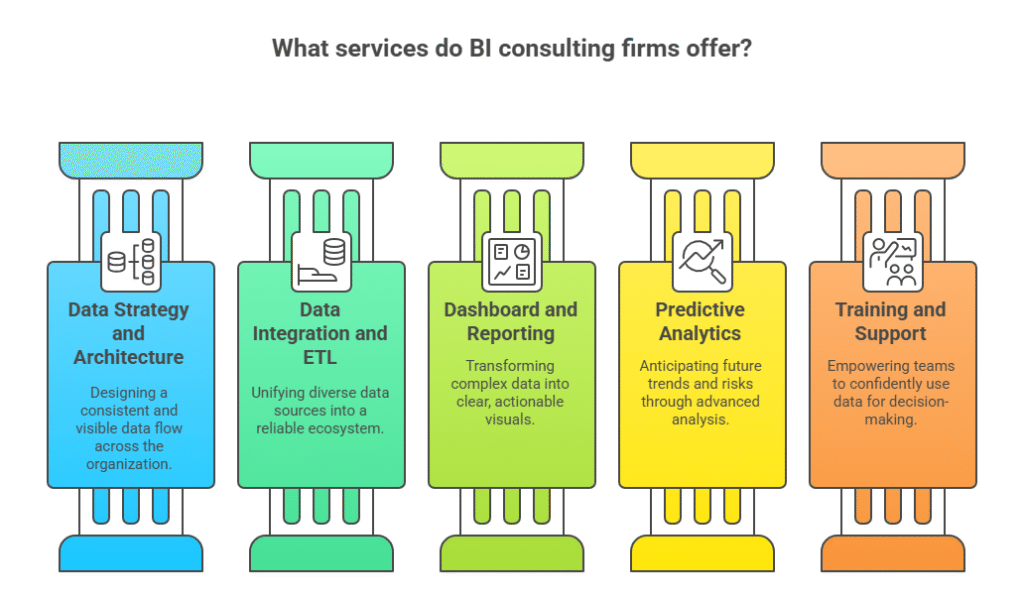
Every company collects data, but few actually use it.
Between CRMs, spreadsheets, and cloud systems, valuable insights stay buried while leaders still make decisions in the dark.
That’s where the gap widens between growth and stagnation. And it’s exactly the gap business intelligence consulting closes.
The numbers show how massive this shift has become. The global BI market (software and services combined) is projected to grow from USD 34.82 billion in 2025 to USD 63.20 billion by 2032, expanding at an 8.9% CAGR.
The reason is simple: clarity pays. Companies that turn raw data into insight operate faster, reduce waste, and stay ahead of market changes.
But getting there takes more than dashboards. It takes experts who understand both the tech and the business side: professionals who can connect fragmented systems, translate numbers into meaning, and build a culture that acts on evidence.
That’s the real job of a BI consultant: transforming data into decisions that drive progress. And in the next sections, we’ll break down how that happens.
- TL;DR
- What Is Business Intelligence Consulting?
- Why Do Businesses Turn to BI Consulting Experts?
- Core Services Offered by BI Consulting Firms
- How does the BI Consulting Process Work?
- What are the Benefits of Business Intelligence Consulting?
- How To Choose the Right Business Intelligence Consulting Partner
- Ready to Put Business Intelligence to Work for You?
- FAQs
TL;DR
Here’s the quick version before we dive deeper:
- Business intelligence consulting turns messy data into decisions that actually make sense.
- When your numbers are scattered, BI experts bring clarity. Clean data, faster insights, and smarter moves.
- Tools like Power BI, Tableau, and Snowflake drive the process, but execution is what separates insight from noise.
- About 68% of business leaders say analytics gives them a real edge. The rest are still catching up.
- Modern BI does more than describe; it predicts, anticipates, and guides.
- The right consultant doesn’t hand you charts. They help you run your business with precision and foresight.
What Is Business Intelligence Consulting?
For starters, business intelligence (BI) consulting helps organizations see what their data’s been saying all along.
It’s about turning scattered information (sales reports, marketing metrics, patient records, supply chain data) into a clear direction.
BI consultants sit between data and strategy. They build systems, dashboards, and frameworks that show what’s working, what’s not, and where growth is hiding.
They also fix a major pain point inside most companies: everyone using different numbers to tell different stories.
The demand for this kind of clarity keeps rising. According to reports, the BI consulting services market hit USD 23.5 billion in 2024 and is projected to reach USD 45.2 billion by 2033, growing at an 8.1% CAGR.
In other words, companies want facts that drive action.
Main Goals of BI Consulting
Business intelligence consulting focuses on a few essential goals:
- Better decisions, fewer assumptions: With solid data guiding the way, leaders don’t have to rely on gut feeling. Instead, they can act with confidence and evidence.
- Smoother operations: Manual reports and disconnected systems slow everything down. BI brings it all together by syncing systems, automating reporting, and giving teams instant access to the data they need
- Visible performance: No more waiting for someone to “pull the numbers.” Dashboards put real-time insights front and centre, so you can spot issues early and fix them before they turn into losses.
- Faster reaction to market shifts: When the market moves, you move faster. Real-time data gives you the agility to pivot strategies in hours and stay ahead of changing conditions.
Tools That Power Business Intelligence
The technology behind BI matters, but only if it solves real problems:
- Microsoft Power BI: Ideal for organizations already within the Microsoft ecosystem.
- Tableau: Great for visual storytelling and executive dashboards.
- Google Looker: Works seamlessly in cloud-based environments.
- Qlik Sense: Designed for self-service BI and intuitive data exploration.
- Snowflake: A secure, scalable cloud data warehouse that supports modern analytics.
Pro Tip: The right tech combination depends on your structure and goals. Skilled consultants adapt tools to the business, not the other way around.
Why Do Businesses Turn to BI Consulting Experts?
Most companies already have data, but what they lack is direction.
Spreadsheets pile up, reports don’t align, and decision-makers lose time trying to make sense of it all.
This is how business intelligence consultants change that dynamic:
- From data overload to clarity. Data chaos kills productivity. Every department tracks its own numbers, but few see the whole picture. Consultants fix that by cleaning, connecting, and visualizing data into one coherent narrative.
- Smarter decisions through reliable insights. BI experts set up systems that give leaders real-time access to critical information. That’s why 68% of business leaders say BI analytics gives them a competitive advantage, as noted by WiFi Talents.
- Stronger efficiency and competitive advantage. Bad data costs time and money. BI consulting eliminates that waste, aligning workflows and making results measurable.
- Systems that scale with growth. As businesses grow, data complexity explodes. BI consultants design frameworks that scale (new sources, teams, and insights) without disruption.
Core Services Offered by BI Consulting Firms

Business intelligence consulting is about building a system that connects data, people, and strategy. That’s why the best firms focus on services that combine technical precision with business outcomes:
Data Strategy and Architecture Design
Every great BI project starts with a solid foundation. Consultants begin by mapping how data moves through your organization: where it comes from, how it’s stored, and who needs access to it.
This blueprint becomes the backbone of every decision that follows. With a clear architecture, teams stop working in silos and finally share the same version of truth.
Data Integration and ETL Development
Disconnected systems are the enemy of good decisions. Most companies store information in separate tools: marketing platforms, financial software, CRMs, or HR systems.
BI experts bridge those gaps using ETL pipelines (extract, transform, load) that clean, standardize, and connect all data sources into one ecosystem.
The impact is immediate: reporting becomes faster, cleaner, and far more reliable.
Dashboard and Reporting Solutions
Once the data foundation is set, visualization brings it to life. Consultants design dashboards that turn complex information into clear stories: ones executives can interpret at a glance.
No more scrolling through static spreadsheets or waiting for reports. Instead, you get dynamic visuals that highlight what matters most and help teams act faster.
Predictive Analytics and AI-Based Insights
Today’s BI doesn’t stop at “what happened.” It asks “what’s next?”
Consultants implement predictive and prescriptive analytics that help organizations anticipate demand, spot risks early, and plan resources more intelligently.
And it’s not just theory: over 52% of enterprises already use AI-enabled analytics for predictive planning.
This evolution transforms BI from a reporting tool into a strategic advantage.
Training and Long-Term Support
Technology alone doesn’t guarantee results; people do.
That’s why top BI consultants invest in training and long-term support. They make sure your teams know how to interpret dashboards, customize reports, and ask better questions with data.
Empowerment is the end goal here. When everyone speaks the language of analytics, insight becomes part of everyday operations.
How does the BI Consulting Process Work?
The process behind BI consulting may vary across firms, but the principle is the same: start with understanding, build with precision, and improve continuously.

Here’s how it goes:
1. Assessment and Goal Definition
Every engagement begins with a deep dive into the business model and challenges.
Consultants align with leadership to define clear goals; be it improving profitability, reducing waste, or enabling faster reporting.
This early alignment keeps the entire project focused on measurable outcomes rather than vague aspirations.
2. Data Preparation and Infrastructure Setup
Next comes the groundwork. Consultants clean, normalize, and connect your data across platforms, ensuring consistency and security from the start.
A solid infrastructure is what allows BI tools to deliver reliable insights instead of more confusion.
3. Insight Delivery Through Dashboards and Reports
Once the system is in place, the insights begin to take shape.
Dashboards reveal performance trends, highlight inefficiencies, and translate KPIs into visuals that actually mean something.
This visibility helps teams react faster and make informed decisions instead of waiting for quarterly reviews.
4. Continuous Optimization and Improvement
BI is a living system, not a one-time project.
Consultants revisit data flows, user adoption, and performance metrics to keep everything aligned with evolving business goals.
This step matters more than most realize: roughly 45% of BI projects fail to meet ROI expectations due to poor integration or weak adoption, as WiFi Talents also notes.
The right consulting partner doesn’t disappear after launch. Instead, they evolve your BI strategy alongside your growth.
What are the Benefits of Business Intelligence Consulting?
Let’s be honest: most companies already have more data than they can handle. What they don’t have is the system to make it work for them.
That’s where BI consulting changes everything:
Access to Proven Expertise and Best Practices
Working with BI consultants is about bringing in experience that shortens your trial and error.
These teams have seen hundreds of data setups (good, bad, and disastrous), and they know exactly what drives results. They also know how to translate complex analytics into language your leadership team actually understands.
That blend of technical depth and practical sense is what turns what we think into what we know.
Faster ROI Through Data-Driven Strategy
Here’s the difference between collecting data and using it: one burns time, the other builds growth.
When consultants build your BI system, they connect the dots between spend and return, effort and impact. You stop reacting to problems and start predicting them.
That shift alone cuts waste, sharpens focus, and delivers measurable ROI faster than most expect.
Simplified Data Management Across Teams
You’ve probably seen it before: sales has one version of a number, finance has another, and marketing doesn’t match either.
Well, that chaos ends the moment BI consulting enters the picture.
Consultants centralize everything into one reliable source of truth, so every team pulls reports from the same data set.
The result of this? Fewer arguments, faster meetings, and decisions made on facts instead of assumptions.
Alignment Between Business and IT
One of the quietest killers of BI projects is misalignment between departments.
The tech team talks in data models and architecture. The business team talks in outcomes and KPIs.
Consultants bridge that gap, turning goals into actionable data workflows. Once both sides speak the same language, projects stop stalling and start delivering.
How To Choose the Right Business Intelligence Consulting Partner
Finding the right BI partner isn’t about who’s the biggest name. In reality, what matters is who gets your business and can prove it with results.
Here’s how to tell the real partners from the ones who just sell dashboards:
Traits That Define a Strong BI Partner
The best consulting partners share a few non-negotiables:
- Proven experience: They’ve worked with businesses like yours and can show measurable outcomes, not just case studies full of buzzwords.
- Transparency: They communicate clearly about pricing, deliverables, and timelines.
- Technical depth: They understand architecture, data modelling, integration, and analytics.
- Adaptability: Their process flexes with your business. They can scale as you grow or adjust when priorities shift.
- Collaboration mindset: They work with your internal teams instead of building silos around the project.
These traits separate consultants who make noise from those who make impact.
Questions That Help You Find the Right Fit
A good BI partner should have answers before you even ask, but the right questions help you see how they think.
So, go beyond surface-level conversations and dig into how they plan, execute, and measure results:
- What specific problems do you think BI can solve for my business?
- How do you define success during a BI engagement?
- Can you walk me through a recent project and its measurable outcomes?
- How do you handle projects where legacy data systems are messy or incomplete?
- What’s your strategy for driving user adoption after launch?
- How do you collaborate with internal IT and business teams?
- Which BI tools do you recommend? And why those over others?
- How do you ensure compliance and data security across regions or regulations?
- What’s your approach to training teams post-implementation?
- How often do you review and optimize BI systems after deployment?
Beyond revealing technical skill, these questions show how invested a consultant is in your long-term success.
If their answers feel scripted or superficial, they’re not truly listening to your needs.
Red Flags That Signal Poor Alignment
If a potential partner checks any of these boxes, think twice before signing:
- Vague deliverables: They promise “insights” without defining measurable KPIs.
- Tool obsession: They push one BI platform as the only solution instead of assessing what fits your stack.
- One-size-fits-all mindset: Their pitch sounds the same no matter your industry or challenge.
- No training or support: Once dashboards are live, they disappear.
- Buzzword overload: They rely on jargon instead of a clear strategy.
If the conversation feels more like a software sales pitch than a strategy discussion, you already have your answer.
Ready to Put Business Intelligence to Work for You?
As you can see, business intelligence consulting is about control: knowing exactly what’s happening in your business and what to do next.
And in some sectors, that control matters even more.
In complex industries, healthcare included, every decision counts, and bad data makes it harder to move fast. That’s why teams partner with experts who understand both the systems and the stakes.
At Medical Flow, we provide business intelligence consulting services that drive healthcare businesses forward. Because when information flows right, care (and business) flows better, too.
Ready to see what your data can actually do for you? Let’s talk.
FAQs
What is business intelligence consulting?
It’s the bridge between raw data and real decisions. Business intelligence consulting services help you organize, clean, and connect your data so leaders stop guessing and start acting with confidence. You’ll get actionable insights, better decision-making, and measurable business results.
How can business intelligence consulting benefit an organization?
It saves time, reduces confusion, and brings clarity to your business processes. When business analytics finally make sense, teams can spot trends early, streamline operations, and respond faster to what really drives performance and key performance indicators (KPIs).
When should a company hire a business intelligence consulting firm?
When reports take too long, numbers don’t match, or growth outpaces your systems. That’s usually the sign you’ve outgrown spreadsheets and need BI consulting to streamline your data analytics and scale decision-making with confidence.
What tools do BI consultants typically recommend or implement?
Top consultants usually work with tools like Power BI, Tableau, Looker, Qlik, and Snowflake.
Each one supports different goals; what matters is choosing the platform that fits your business decisions, not forcing your team to adapt to the tool.
How do business intelligence consultants approach data integration challenges?
They start by diagnosing the issue, then build connections that clean, unify, and automate data across systems.
The result? One single source of truth your organization can trust, supporting consistent KPIs, faster reporting, and smoother decision-making across every department.

 By
By 





